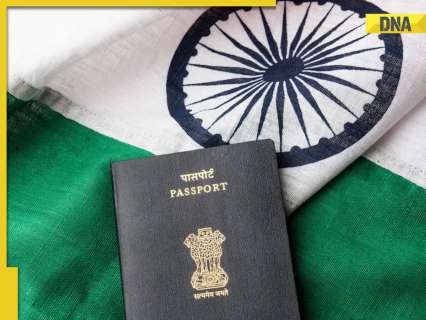Now Reading: India launches e-passports with unique features in 13 cities, know what will happen to paper ones
-
01
India launches e-passports with unique features in 13 cities, know what will happen to paper ones
India launches e-passports with unique features in 13 cities, know what will happen to paper ones

India on Tuesday officially launched in 13 cities the first phase of its next-generation e-passport initiative, combining advanced electronic technology with the traditional paper passport format to enhance identity verification and strengthen travel document security. According to the Ministry of External Affairs (MEA), this project began under a pilot phase in conjunction with the Passport Seva Programme (PSP) Version 2.0, which was initiated in April last year.
India launches e-passports with unique features in 13 cities, know what will happen to paper ones
India on Tuesday officially launched in 13 cities the first phase of its next-generation e-passport initiative, combining advanced electronic technology with the traditional paper passport format to enhance identity verification and strengthen travel document security. According to the Ministry of External Affairs (MEA), this project began under a pilot phase in conjunction with the Passport Seva Programme (PSP) Version 2.0, which was initiated in April last year.
Govt launches e-passports in 13 cities
The MEA confirmed that this is the first stage of a nationwide implementation expected to reach all Passport Seva Kendras across the country by mid-2025. The e-passports are currently being issued in several cities, including Nagpur, Bhubaneswar, Jammu, Goa, Shimla, Raipur, Amritsar, Jaipur, Chennai, Hyderabad, Surat, Ranchi, and Delhi. Tamil Nadu, notably, began issuing e-passports on March 3, 2025, at the Chennai Regional Passport Office. By March 22, 2025, the state had already issued 20,729 e-passports.
Features of e-passports
These high-tech passports are distinctly identifiable from regular ones, featuring a gold-coloured symbol printed below the front cover. Internally, they include an embedded Radio Frequency Identification (RFID) chip and antenna within the inlay. The integration of Public Key Infrastructure (PKI) is a critical aspect, ensuring secure storage of biometric and personal data while verifying its accuracy and authenticity.
The MEA highlighted that one of the primary advantages of e-passports lies in their enhanced data protection capabilities. This advanced technology helps preserve the integrity of the holder’s information, significantly reducing the risk of tampering or identity forgery. It also addresses the growing concern over the fabrication of fake passports, which has been a challenge during International Border surveillance.
While the introduction of e-passports marks a major step forward in passport modernisation, the MEA has clarified that switching to the new format is not mandatory. All existing passports issued by the Government of India will remain valid until they reach their respective expiration dates.
(Except for the headline, this story has not been edited by DNA staff and is published from IANS)
























